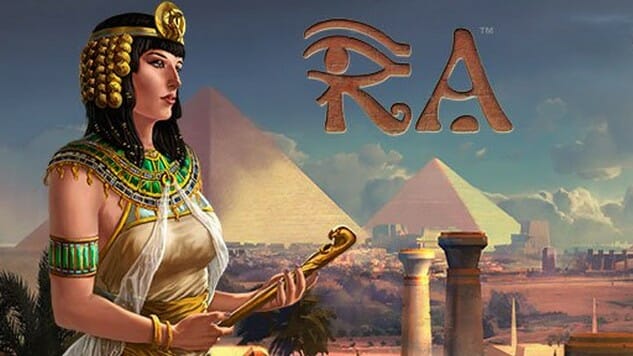
The current surge in interest in better boardgames (German-style, Euro, whatever you want to call them) has led some of the biggest publishers to bring back titles that had fallen out of print or were just in need of a refresh. Two very highly-regarded games are now out in brand-new editions, Reiner Knizia’s Ra and Uwe Rosenberg’s Agricola.
Ra is an Egyptian-themed boardgame from the prolific designer Knizia that uses one of his favorite mechanics—the single-round auction, also found in earlier games like Medici. Players in Ra attempt to collect groups of tiles from a central space through a simple bidding system of tokens (rather than money), trying to accumulate tiles in specific arrangements to satisfy the game’s many ways to gain or lose points. There are three rounds, called “epochs,” after each of which players score for the tiles they have and then are forced to discard some of those tiles. At the end of the game, there’s a final scoring that credits entirely different tiles … which sounds a bit more complicated as I write it than it works when you’re playing.
Ra players start the game with numbered tokens, from two to five depending on the number of players, which they’ll then use to bid on the tiles that appear in the central space. Those tiles come one at a time, at random, from a bag that holds all 180 tiles at the start of the game. Most tiles will somehow help players earn points; a few “disaster” tiles force the player who takes one to discard up to two tiles; and Ra tiles pause the game to auction off all tiles currently on the board. Players may use one of their tokens to bid, with the highest bidder winning, and then exchange that token for the token on the board, which was either the 1-point token from the start of the game or the last token used to win an auction. Each epoch continues until all players have used all their bid tokens or X Ra tiles have appeared.
There are seven classes of tiles, and each scores in a completely different way. The key ones to know:
1. Civilization tiles, of which there are five types; you gain points if you collect three different ones in any epoch, but lose five points if you end an epoch without any such tiles. All civilization tiles are discarded at the end of each epoch.
2. God tiles, worth two points apiece at the end of each epoch and then discarded. A player may choose not to draw a tile on his/her turn and instead exchange a god tile for any single tile currently in the central space. It’s a good way to fill out a set or to grab a civilization tile and avoid the five-point penalty.
3. Monument tiles, of which there are eight. These only score at the end of the game, and score in two different ways: you get points for any set of three or four of the same tile, you score one point per different tile type, with bonuses for collecting seven or all eight.
There’s a lot to keep track of in Ra, although my ten-year-old daughter was able to keep everything balanced in her head once she realized she could lose points for missing certain things. The new edition from Fantasy Flight—part of their Euro Classics reissue series—has updated graphics and a larger, square box, while replacing some wooden components with cardboard (a tradeoff in quality for lighter weight). This edition includes rules for two players, as well as the standard rules for up to five, and games typically take under an hour once everyone grasps the scoring. I find the rule that has you discarding many tiles after each epoch to be sort of like telling you to tear down that sandcastle you just spent all that time constructing, while the diverse scoring rules do veer a little bit more towards “work” rather than play. Ra is very well-balanced, however, with enough randomness from the tile draw to give it replay value, and there’s a bit of interactivity in the competition for tiles in the center and in the scoring of pharaoh tiles. It’s a solid game and a welcome return to the market.
Keith Law is a senior baseball writer for ESPN.com and an analyst on ESPN’s Baseball Tonight. You can read his baseball content at search.espn.go.com/keith-law and his personal blog the dish, covering games, literature, and more, at meadowparty.com/blog.
